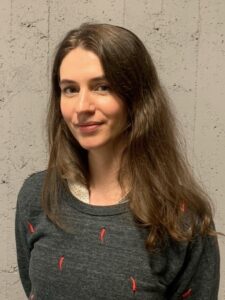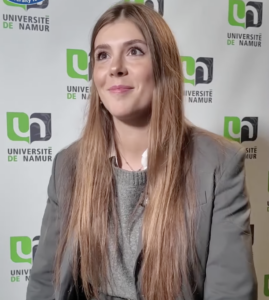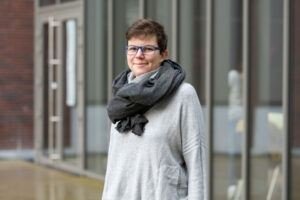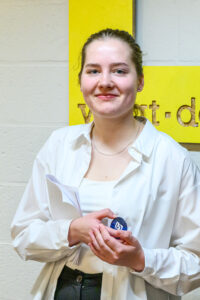An international day dedicated to Women and Girls in Science
Around the world, there has been a significant gender gap in science, technology, engineering and mathematics (STEM) for many years. Although women have made immense progress in terms of their participation in higher education, they remain under-represented in these scientific categories.
To promote the empowerment of women and girls in STEM and to raise awareness of the need to include women in science and technology, the United Nations General Assembly proclaimed 11 February ‘International Day of Women and Girls in Science’ in 2015.
Portraits
Anne-Catherine Heuskin, Professor, Department of Physics · UNamur

What is your scientific field and what do you study/research?
I’m a physicist and the subject of my Master thesis was a mixture of physics and biology: radiobiology. The idea is to use ionising radiation to damage cells, particularly cancer cells. At the Nuclear Reaction Analysis Laboratory (LARN) we have a particle accelerator that produces protons and alpha particles. These particles can be used to irradiate cancer cell cultures in order to destroy their genetic material and prevent them from proliferating. In clinical practice, X-rays are usually used, as they are easier to produce, with less bulky and less expensive equipment. But in terms of effectiveness, we hope to achieve better results with charged particles, such as the one used here. This is the basis of proton therapy.
What is your involvement in the European university alliance UNIVERSEH ?
Ionising radiation is also encountered in space. Astronauts in the International Space Station are exposed to doses far more intense than those received on the surface of the Earth. This radiation has an effect on living organisms. As part of this, I am working on the RISE (Rotifer in Space) project, launched in 2013 with Boris Hespeels and Karin Van Doninck, in partnership with the Environmental and Evolutionary Biology Research Unit (URBE) at UNamur, ULB and SCK-CEN. This project is about rotifers, organisms that are extremely resistant to various conditions: cold, temperature variations, desiccation, very high radiation dosage, etc. Our aim is to understand how they would react in an environment such as the ISS and whether they develop specific strategies to protect their genomic integrity, which could be used to protect humans in space.
Discover more about the RISE projet.
Do you think that being a woman has influenced your career as a scientist?
Above all, whether they are men or women, scientists are rather special animals: they eat, sleep and think science all the time. But you have to have the opportunity to do so. If you’re a woman in today’s society, that can be more complicated, not least because of the many clichés that persist.
I remember on one National Holiday, I was emptying my washing machine when I got a message from a colleague saying ‘I’m reading a great review!”. And that’s when I thought “Great, I’m cleaning pants”. We don’t all live in the same reality. There are those who have a family, a house, with all the mental workload that goes with it. And then there are those who don’t (yet) have children and have fewer things to think about outside their job. Sometimes I think I have to keep catching up with people who are much more competitive, but who also have much more time to devote to research.
What do you think could facilitate and encourage the careers of women scientists?
I teach all first-year science students and I’ve noticed that there are a lot of girls in the life sciences, such as biology and veterinary medicine, but far fewer in mathematics and physics. It’s quite unbalanced. So how can we encourage more women to take up these disciplines? I think it starts at a very young age.
Interest in sciences is built up from childhood, through education and the image of the world transmitted to them by their family. It’s not at the age of 18 that the question needs to be asked. We need to show them the range of possibilities and make sure they understand that science is neither ‘for girls’ nor ‘for boys’.
The right time to arouse this curiosity is when children start to reason and ask questions: why does the sun always rise in the same place? What happens to an ice cube when it melts? Why does it steam up when you blow on a cold glass? That’s when you can help them, explain things to them and encourage them to look for answers. We need to give children a taste for explaining and questioning the world.
What message would you like to give to any woman who might be hesitant about studying science?
I think the message is valid for all students, whether they are boys or girls: why do you want to study this or that subject? What is your motivation? If it’s because your parents told you to, that’s not a good reason. If it’s because you’re strong in a subject so you’re going to study it, that might not be a good justification either. What counts above all is the desire. The desire to understand, to discover, to question the world around us.
Justine Bodart, PhD Student, Department of Mathematics · UNamur

What is your scientific field and what do you study/research?
I work with Professor Anne-Sophie Libert at the naXys Institute on the study of the stability of extra-solar systems and celestial dynamics. I am also part of the Student Council of the UNIVERSEH alliance as a PhD student representative.
Do you think that being a woman has influenced your career as a scientist?
I think that being a woman can influence a scientific career because of the stereotypes that still exist, but this should reinforce our desire to change mentalities and inspire other women.
What do you think could facilitate and encourage the careers of women scientists?
We need to give greater visibility to the contributions of women in the scientific world, encourage their input and value their historical role, which is often underestimated. I think it’s also important to combat gender bias and create a more inclusive working environment.
Eve-Aline Dubois, Researcher, Department of Science, Philosophy and Society · UNamur

What is your scientific field and what do you study/research?
I work in the history and philosophy of science. I am particularly interested in the historical and philosophical developments of cosmology. After studying the competing Big Bang theory and its history in the twentieth century, I am now working on the emergence of the concept of an infinite universe.
Do you think that being a woman has influenced your career as a scientist?
I think that all aspects of my identity influence and will influence my career: my gender, my age, my nationality, etc. Whether it’s the way I approach my career or the way my colleagues see me. Whether it’s the way I approach my career or the way my colleagues see me.
What do you think could facilitate and encourage the careers of women scientists?
All kinds of career projects should be encouraged and supported. Everyone cites Marie Curie as an example, but that’s just an example. Let’s talk about Verra Rubin, Margaret Burbidge, Henrietta Leavitt and all their colleagues. Women in science are not a novelty or a rarity, but they are names that have been forgotten and erased.
What message would you like to give to any woman who might be reluctant to take up astronomy?
Why are you hesitating? This career is gripping, exciting, testing, overwhelming and rewarding. You need to be motivated and ready to give it your all. Your gender doesn’t affect your skills, so if you’re tempted, GO FOR IT!
Any inspirational messages to share?
I like to share Fred Hoyle’s quote: ‘You must understand that, cosmically speaking, the room you are now sitting in is made of the wrong stuff. You, yourself, are odd. You are a rarity, a cosmic collector’s piece.’ Studying astronomy, or cosmology, means coming face to face with immensity and sometimes wondering where we fit in. I find it quite comforting to remember that our uniqueness makes us a little treasure.
Emelyne Berger, Student, Department of Physics · UNamur

What is your field of science and what are you studying?
I’m studying physics… but not just physics! The Bachelor’s degree course provides us with a solid, general foundation that will enable us to choose a more specialised Master’s degree. We develop a wide range of knowledge, from chemistry to programming and the human sciences, not forgetting the mathematics that is essential for developing theories. We are also encouraged to experiment and discover scientific research.
In 2024, along with a small group of students, I joined the UNIVERSEH alliance as a member of the Namur Local Student Club. We were able to take part in the organisation of the General Meeting last November during an activity aimed at European students. I also took part in the Spring School organised in 2024 by UNamur at “Euro Space Center” and I’m preparing for a trip to Sweden at the beginning of March as part of the Arctic Winter School.
Do you think that being a woman has influenced your career as a scientist?
I’ve always been encouraged to do what I like, so societal ideas about ‘masculine’ or ‘feminine’ subjects didn’t really influence my choice of study. Lack of support and self-confidence can be a hindrance when you enter a world that doesn’t seem to be your own. Of course, you may have to fight with some people, but you can make your mark, like anyone else, as a woman.
What do you think would help and encourage women to study science and, ultimately, to pursue a career in science?
All you need to do is look at the history of science to understand that every human being is capable of great things if given the chance. These days, the female figures who have left their mark on science are increasingly recognised, which is a good thing and gives the next generation of scientists a diversity with which to identify. They, like them, have paved the way for us to be free to choose what we want to do with our lives.
I find it unfortunate that it still takes events like this one to underline the fact that we are all equal. I just think that everyone should be encouraged to pursue what they’re drawn to and valued according to their abilities.
What message would you like to give to any woman who might be reluctant to take up astronomy?
When you find your path, you have to follow it. I would tell her not to hesitate and that if it turns out in the end that the path doesn’t suit her, this is in no way a sign of inferiority or incapacity.
Any inspirational messages to share?
The message I’d like to share is a short phrase that I’ve been trying to keep in mind ever since it was passed on to me: Don’t try, just do it.
Discover the full article in French on UNamur’s newsroom.